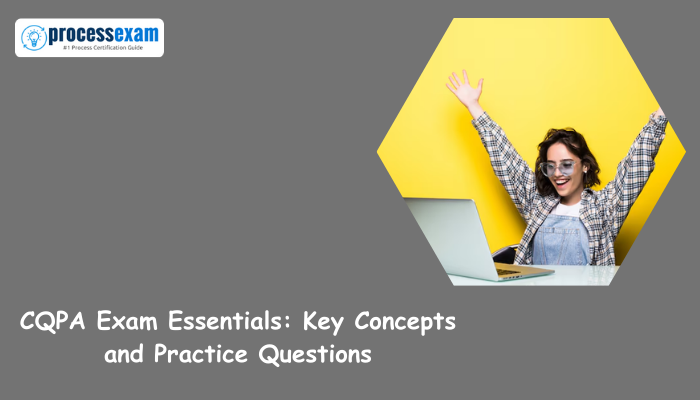
Preparing for the ASQ Certified Quality Process Analyst CQPA certification exam requires dedication, focus, and effective study strategies. Achieving the certification demonstrates your expertise in analyzing and improving organizational processes to enhance overall quality. To help you succeed in your preparation, here are ten valuable study tips tailored specifically for the CQPA exam:
Who Is A CQPA or Certified Quality Process Analyst?
The Certified Quality Process Analyst is a professional assistant who, under the guidance of quality engineers or supervisors, examines and resolves quality issues while participating in enhancement initiatives. This individual could be a recent graduate or someone with practical experience seeking to showcase their expertise in quality methodologies and techniques.
Eligibility to Earn the CQPA Certification:
The aspirant must have 2 years of experience gained from working in one or more fields relevant to the CQPA or possessing an associate degree or two years of comparable higher education.
Here Are the Study Tips to Prepare for the CQPA Certification Exam:
Gain Clarity on the CQPA Exam Structure:
Before diving into your study routine, familiarize yourself with the structure and content of the CQPA exam. It typically consists of multiple-choice questions to assess your understanding of quality management principles, statistical analysis, process improvement methodologies, and relevant tools and techniques. Knowing what to expect will guide your preparation efforts effectively.
Follow A Study Schedule for the CQPA Certification Exam:
Develop a comprehensive study schedule that allocates sufficient time for reviewing each CQPA exam topic. Break down your study sessions into manageable chunks, covering one topic at a time. Consider your other commitments and set realistic goals to ensure consistent progress leading up to the exam date.
Study from Reliable Sources:
Gather reputable study materials such as textbooks, practice exams, and online resources endorsed by ASQ or reputable educational institutions. These resources should align closely with the CQPA exam content outline and provide clear explanations, examples, and practice questions to reinforce your understanding.
Focus on Core CQPA Exam Concepts:
Prioritize your study efforts by focusing on core concepts and principles outlined in the ASQ Body of Knowledge for the CQPA certification. Pay special attention to statistical process control, quality improvement tools, data analysis techniques, and process documentation standards.
Practice Problem-Solving:
Effective problem-solving skills are essential for the CQPA exam, which requires applying theoretical knowledge to real-world scenarios. Engage in regular practice exercises and case studies that challenge your ability to analyze process data, identify root causes of quality issues, and implement corrective actions effectively.
Join Study Groups or Forums for the CQPA Exam Preparation:
Consider joining study groups or online forums dedicated to CQPA exam preparation. Collaborating with fellow candidates allows you to exchange insights, discuss challenging topics, and gain different perspectives on complex concepts. Additionally, group discussions can enhance retention and deepen your understanding of key exam subjects.
Assess Your Knowledge with CQPA Practice Tests:
Simulate the exam experience by taking CQPA practice exams under timed conditions. This assesses your knowledge and readiness and familiarizes you with the exam format and question types. Analyze your performance on practice tests to identify areas of improvement and adjust your study plan accordingly.
Revise the Previously Covered Materials:
Regularly review previously covered material to reinforce your understanding and retention. Schedule dedicated review sessions where you revisit key concepts, revisit challenging topics, and solve additional practice problems to solidify your knowledge base.
Gain Knowledge of Industry Trends:
Stay ahead of current trends, developments, and best practices in quality management and process improvement. Follow reputable industry publications, attend webinars, and join professional associations to gain insights into emerging methodologies, technologies, and standards relevant to the CQPA exam.
Maintain A Positive Mindset throughout the Preparation:
Maintaining a positive mindset throughout the exam preparation journey is crucial for staying motivated and focused. Embrace challenges as opportunities for growth, celebrate your progress, and stay confident in your ability to succeed. Visualize yourself achieving your certification goals, and let that drive your determination and perseverance.
Reasons to Use CQPA Practice Tests for Preparation:
Become Familiar with the Exam Format:
Practice tests simulate the structure and format of the CQPA certification exam, offering candidates a chance to experience the types of questions, time constraints, and overall flow of the exam. Becoming familiar with these aspects can significantly reduce test anxiety and nervousness by providing a sense of what to expect on exam day. As candidates repeatedly engage with practice tests, they develop comfort and confidence in navigating the exam, ultimately enhancing their readiness for the real test.
Identify Weaknesses with CQPA Practice Tests:
Through practice tests, candidates can assess their proficiency in various areas covered by the CQPA certification. By analyzing their performance on practice questions, candidates can pinpoint specific topics or concepts where they may be lacking understanding or skills. This self-assessment allows candidates to prioritize their study efforts, focusing more time and attention on areas where improvement is needed. By addressing weaknesses identified through practice tests, candidates can enhance their readiness and competence for the certification exam.
Build Confidence with CQPA Practice Tests:
Regular engagement with CQPA practice tests exposes candidates to exam-like questions and scenarios, gradually building their confidence in tackling challenging topics and problem-solving situations. As candidates repeatedly tackle practice questions and successfully apply their knowledge and skills, they develop a sense of mastery and assurance in their abilities. This growing confidence is invaluable on exam day, as it helps candidates remain calm under pressure, reduces stress, and fosters better concentration. Ultimately, the confidence gained through consistent practice empowers candidates to perform at their best and achieve success on the actual CQPA certification exam.
Bottom Line:
Preparing for the ASQ Certified Quality Process Analyst CQPA certification exam requires a strategic and disciplined approach. By following these study tips, you can enhance your readiness, confidence, and, ultimately, your chances of success on exam day. Remember to stay organized, stay focused, and stay committed to your goal of becoming a certified quality professional.
